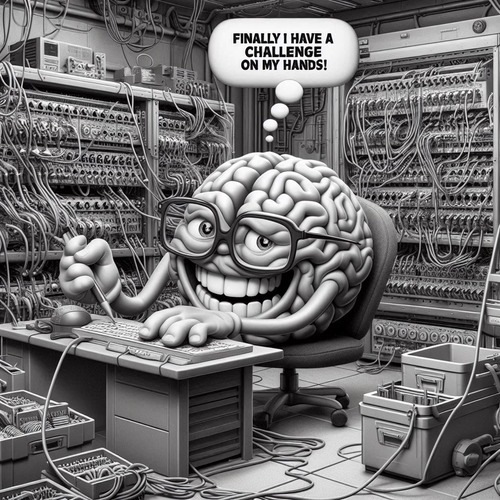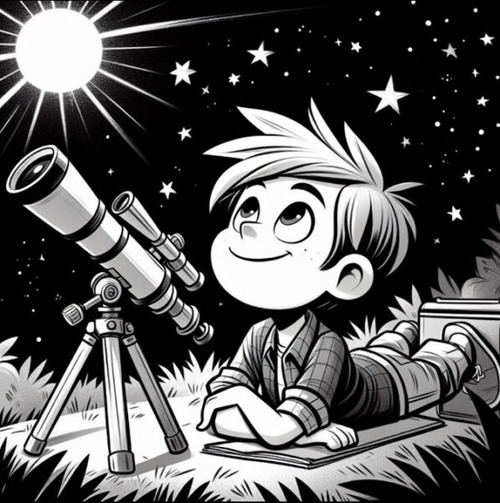Our Consciousness and Rationality: Is God the Best Explanation?
Consciousness and Rationality: Is God the Best Explanation? In the ongoing debate between believers and sceptics, few topics are as profound and perplexing as the nature of human consciousness and rationality. While materialists argue these phenomena can be explained solely through physical processes, theists contend these point to something beyond the material world. This post delves into why we assert our ability to reason poses a significant problem for atheistic worldviews.
The Problem of Consciousness
Consciousness, our subjective experience of the world, has long puzzled philosophers and scientists alike. The “hard problem of consciousness”—explaining how subjective experiences arise from objective brain processes—remains unsolved.
Materialism’s Struggle with Consciousness: According to a materialistic worldview (often held by atheists), all that exists is matter—atoms and molecules interacting according to the laws of physics. But how does matter, no matter how complex, create subjective experience? Consciousness doesn’t appear to be reducible to physical processes. Philosopher Thomas Nagel famously referred to this as the “hard problem” of consciousness, arguing subjective experience cannot be fully explained by physical terms alone.
The challenge is clear: consciousness is not something we can explain by simply appealing to the material world. In fact, trying to get consciousness from matter alone is like trying to get something from nothing—it defies logic. If we assume a purely materialistic explanation for consciousness, we are left without any satisfying account for why we have the ability to be aware of our own existence, thoughts, and experiences.
Rationality: A Deeper Challenge
While consciousness is mysterious, rationality presents an even more formidable challenge to atheistic materialism. Rationality refers to our ability to think logically, form abstract concepts, and discover truth about the world. It’s the foundation of our scientific endeavours and philosophical inquiries.
Naturalism’s Dilemma: If our brains are the result of blind, unguided processes like natural selection, then our cognitive faculties—our capacity to reason—are merely the product of evolution. But here’s where it gets tricky: evolution doesn’t care about truth, it only cares about survival. Our brains have been “wired” to help us survive and reproduce, not necessarily to deliver accurate or true beliefs. Why, then, should we trust that our reasoning faculties are reliable if they evolved solely for survival purposes?
This is a critical problem for atheism. If our rationality evolved through a series of random, unguided processes, we have no reason to trust it. As Alvin Plantinga’s Evolutionary Argument Against Naturalism (EAAN) points out, this leads to a self-defeating situation for atheists: if you believe your mind is the product of evolutionary processes that only aim for survival, you have no grounds to trust the rational faculties you’re using to deny God’s existence in the first place!
The Atheistic Worldview and Its Challenges
In an atheistic framework, our cognitive abilities are the product of natural selection—a process concerned with survival and reproduction, not truth-finding. This raises a troubling question: if our minds evolved solely for survival, why should we trust them to discern truth about the universe?
Philosopher Alvin Plantinga’s EAAN formalises this concern. He argues the probability of our cognitive faculties being reliable, given naturalistic evolution, is low. This creates a defeater for naturalism itself, as it undermines our ability to trust our own reasoning.
Rationality’s Challenge to Atheism
The reliability of our rationality requires an explanation. Materialistic accounts struggle to provide a satisfactory grounding for this reliability. If our thoughts are merely the result of physical processes shaped by survival pressures, why should they correspond to truth?
Theism offers an alternative explanation: our rationality is grounded in a rational creator. If our minds are designed by a rational God, we have reason to trust their ability to discern truth about the world.
The Astonishing Capabilities of the Human Mind: Can Random Processes Explain It All?
As you consider each of the following remarkable features of human rationality, ask yourself: Can a brain that evolved through random processes really account for all these sophisticated capabilities?
- Intentionality: The ability to think about things
- Teleology: The capacity for goal-directed behaviour
- Logical laws: The ability to recognise and use laws of logic
- Abstract thinking: The capability to form and manipulate abstract concepts
- Libertarian free will: The power to make free choices
- Unity of consciousness: A unified sense of self and experience
- Qualia: Subjective conscious experiences
- Semantic meaning: The ability to understand and create meaning
God is the Best Explanation
The theistic worldview provides a coherent explanation for the correspondence between our minds and reality. As CS Lewis argued in his “argument from reason,” the very fact that we can reason about the universe suggests that reason itself is fundamental to reality—pointing to a mind behind the cosmos.
Counterarguments and Responses
Atheists might argue that rationality could emerge from complex systems or that evolution could select for truth-tracking cognitive abilities. However, these explanations still struggle to account for the reliability of our abstract reasoning capabilities, especially in domains far removed from survival pressures.
Theism, on the other hand, provides a straightforward explanation for why our minds can grasp abstract truths about mathematics, logic, and the fundamental nature of reality.
Implications and Conclusion
Rationality’s Challenge to Atheism presents a significant hurdle for materialistic worldviews. It suggests theism provides a more coherent explanation for our rational capabilities than atheistic materialism. As CS Lewis notes, our ability to think and reason is the “cardinal difficulty with naturalism.”
As we continue to explore the nature of consciousness and rationality, we must grapple with these fundamental questions about the origins of our cognitive abilities. The correspondence between our minds and the intelligibility of the universe remains a powerful argument for a rational mind behind it all.
Consciousness and Rationality: Is God the Best Explanation?—Related FAQs
- How does Victor Reppert’s argument from reason support theism? Victor Reppert, building on CS Lewis’s work, presents the argument from reason. He contends that naturalism struggles to account for the reliability of human reason, which requires the laws of logic to be more than mere descriptions of thought patterns, our ability to grasp these laws, and our thoughts having semantic content and intentionality. Reppert argues theism offers a more satisfactory explanation for these features.
- What is Alvin Plantinga’s Evolutionary Argument Against Naturalism (EAAN)? Plantinga’s EAAN posits the probability of our cognitive faculties being reliable, given naturalistic evolution, is low. This leads to a defeater for the reliability of cognitive faculties that can’t be overcome without circular reasoning, making naturalism self-defeating. Plantinga concludes theism provides a more coherent foundation for trusting our cognitive abilities.
- How does JP Moreland’s argument from consciousness support theism? Moreland approaches the issue from the perspective of consciousness. He argues the existence of conscious states, which are not reducible to physical states, and their regular correlation with physical states, calls for an explanation. Moreland contends that among the possible explanations—physical-to-mental causation, mind-body dualism, or God’s intervention—theism provides the most satisfactory account.
- What is Angus Menuge’s contribution to the argument from reason? Angus Menuge has developed “agents of reason” arguments, asserting that rational agency requires libertarian free will, enduring personal identity, the ability to deliberate, intentionality, and qualia. Menuge argues that naturalism struggles to account for these features, while theism can readily explain them. Menuge argues naturalism struggles to account for these features, while theism can readily explain them.
How do theists respond to the claim that science will eventually explain consciousness? Theists often respond by pointing out: The “hard problem of consciousness” remains unsolved and may be in principle unsolvable by materialistic science. Even if science could describe all the neural correlates of consciousness, it wouldn’t explain the subjective experience itself. The claim that science will eventually explain consciousness is often seen as a “promissory note” rather than a current scientific explanation. Some argue consciousness is fundamentally non-physical and thus outside the realm of materialistic scientific explanation.
How do theists counter the argument that our rationality is just an evolutionary adaptation? Theists might respond with several points: Evolution selects for survival, not necessarily for truth. There’s no guarantee that evolved cognitive mechanisms would be reliable for abstract reasoning. Our ability to reason about abstract concepts (like mathematics or philosophy) seems to far exceed what would be necessary for mere survival and reproduction. If our cognitive faculties are purely the result of non-rational processes, we have reason to doubt their reliability, which leads to a self-defeating position. The theistic view that we are created in the image of a rational God provides a more robust foundation for trusting our rational faculties.
Consciousness and Rationality: Is God the Best Explanation?—Our Related Posts
- DNA Evidence for Intelligent Design: New Challenges for Evolution
- Irreducible Complexity: A Compelling Case for Intelligent Design
- Conspicuous Gaps in the Evolution Narrative
- Defending Creationism: Responses to Evolutionists
- Origin of The Universe: Gaping Holes in Naturalist Explanations
Editor's Pick

From Empty to Overflow: The Abundant Life Jesus Promised
(AND WHY YOU SHOULDN’T SETTLE FOR LESS) We're surviving, but are we thriving? If we're honest, there's a gap between [...]

What Does Jesus Save Us From?
THREE BIBLE TRUTHS ABOUT SALVATION "Jesus saves." We’ve seen it on bumper stickers, heard it shouted at sporting events, maybe [...]

If God Wants Everyone Saved, Why Aren’t They?
THE REFORMED VIEW ON GOD’S DESIRE VS HIS DECREE The question haunts every believer who has lost an unbelieving loved [...]

The One Man Mystery in Acts 17:26: Is It Adam Or Noah?
When the Apostle Paul stood before the philosophers at Mars Hill, he delivered an insightful statement about human unity: “And [...]

Megiddo Or Jerusalem: Where Did King Josiah Die?
Recent archaeological discoveries at Tel Megiddo continue to reveal evidence of Egyptian military presence during the late 7th century BC, [...]

Losing Your Life Vs Wasting It: How Are the Two Different?
AND WHY DID JESUS PRAISE THE FORMER? Jesus spoke one of the most perplexing statements in Scripture: “For whoever wants [...]

Can Christians Be Demon Possessed? What the Bible Teaches
Perhaps you’ve witnessed disturbing behavior in a professing Christian, or you’ve struggled with persistent sin and wondered if something darker [...]

Sacred Fury: What Christ’s Temple Cleansing Truly Means
Mark 11 records the crack of a handmade whip that echoed through the temple corridors. Tables crashed to the ground, [...]

Did Jesus Cleanse the Temple Twice?
OR DID JOHN DISAGREE WITH THE SYNOPTICS ON TIMING? One of sceptics’ favourite "gotcha" questions targets what they see as [...]

Self-Authentication: Why Scripture Doesn’t Need External Validation
"How can the Bible prove itself? Isn't that circular reasoning?" This objection echoes through university classrooms, coffee shop discussions, and [...]
SUPPORT US:
Feel the Holy Spirit's gentle nudge to partner with us?
Donate Online:
Account Name: TRUTHS TO DIE FOR FOUNDATION
Account Number: 10243565459
Bank IFSC: IDFB0043391
Bank Name: IDFC FIRST BANK






